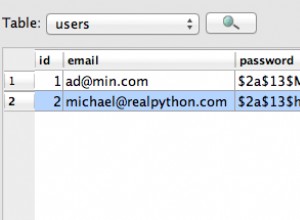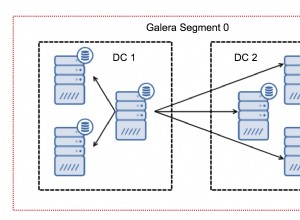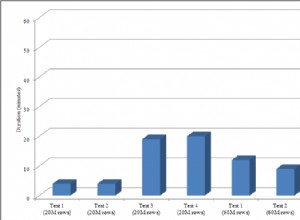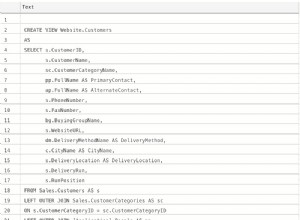Ho condotto un esperimento sulla gestione degli spazi tra Oracle e SQL Server perché ho notato la differenza quando si utilizza Oracle per il mio lavoro.
(La versione di Oracle è Oracle 19c e la versione di SQL Server è SQL Server 2019 poiché questi erano già stati installati nel mio PC.)
Esperimento
Oracolo
Ho condotto un esperimento sotto la tabella e i dati seguenti.
CREATE TABLE CompareTestTable
(
Seq NUMBER
,ColCHAR CHAR(10)
,ColVARCHAR VARCHAR2(10)
);
INSERT INTO CompareTestTable VALUES( 1, 'aaa', 'bbb' ); -- No space
INSERT INTO CompareTestTable VALUES( 2, 'aaa ', 'bbb ' ); -- A space after a string
INSERT INTO CompareTestTable VALUES( 3, ' aaa', ' bbb' ); -- A space before a string
INSERT INTO CompareTestTable VALUES( 4, ' aaa ', ' bbb ' ); -- Spaces after and before a string
select * from CompareTestTable where ColCHAR = 'aaa'; -- Hit SEQ=1,2 records
select * from CompareTestTable where ColCHAR = 'aaa '; -- Hit SEQ=1,2 records
select * from CompareTestTable where ColCHAR = ' aaa'; -- Hit SEQ=3,4 records
select * from CompareTestTable where ColCHAR = ' aaa '; -- Hit SEQ=3,4 records
select * from CompareTestTable where ColVARCHAR = 'bbb'; -- Hit SEQ=1 record
select * from CompareTestTable where ColVARCHAR = 'bbb '; -- Hit SEQ=2 record
select * from CompareTestTable where ColVARCHAR = ' bbb'; -- Hit SEQ=3 record
select * from CompareTestTable where ColVARCHAR = ' bbb '; -- Hit SEQ=4 record
Lo spazio dopo la stringa sembra essere ignorato quando il tipo di colonna è Char.
Tuttavia, nel caso di Varchar2, lo spazio dopo o prima della stringa non sembra essere ignorato.
Il dettaglio è il seguente
https://docs.oracle.com/cd/B13789_01/server.101/b10759/sql_elements002.htm#:~:text=Nonpadded%20Comparison%20Semantics,-Oracle%20compares%20two&text=If%20two%20values%20of% 20diversi,i%20valori%20sono%20considerati%20uguali.
SQL Server
Come nello stesso caso per Oracle, ho condotto un esperimento nella seguente tabella e dati su SQL Server.
CREATE TABLE CompareTestTable
(
Seq INT
,ColCHAR CHAR(10)
,ColVARCHAR VARCHAR(10)
)
INSERT INTO CompareTestTable VALUES( 1, 'aaa', 'bbb' ); -- No space
INSERT INTO CompareTestTable VALUES( 2, 'aaa ', 'bbb ' ); -- A space after a string
INSERT INTO CompareTestTable VALUES( 3, ' aaa', ' bbb' ); -- A space before a string
INSERT INTO CompareTestTable VALUES( 4, ' aaa ', ' bbb ' ); -- Spaces after and before a string
select * from CompareTestTable where ColCHAR = 'aaa'; -- Hit SEQ=1,2 records
select * from CompareTestTable where ColCHAR = 'aaa '; -- Hit SEQ=1,2 records
select * from CompareTestTable where ColCHAR = ' aaa'; -- Hit SEQ=3,4 records
select * from CompareTestTable where ColCHAR = ' aaa '; -- Hit SEQ=3,4 records
select * from CompareTestTable where ColVARCHAR = 'bbb'; -- Hit SEQ=1,2 records
select * from CompareTestTable where ColVARCHAR = 'bbb '; -- Hit SEQ=1,2 records
select * from CompareTestTable where ColVARCHAR = ' bbb'; -- Hit SEQ=3,4 records
select * from CompareTestTable where ColVARCHAR = ' bbb '; -- Hit SEQ=3,4 records
Il risultato di Char è lo stesso di Oracle.
Tuttavia, nel caso di Varchar, il risultato è diverso tra Oracle e SQL Server, gli spazi dopo o prima della stringa sembrano essere ignorati.
Pertanto, dovrebbe essere notato quando si utilizza varchar a causa della differenza tra Oracle e SQL Server in quanto tale sopra.




